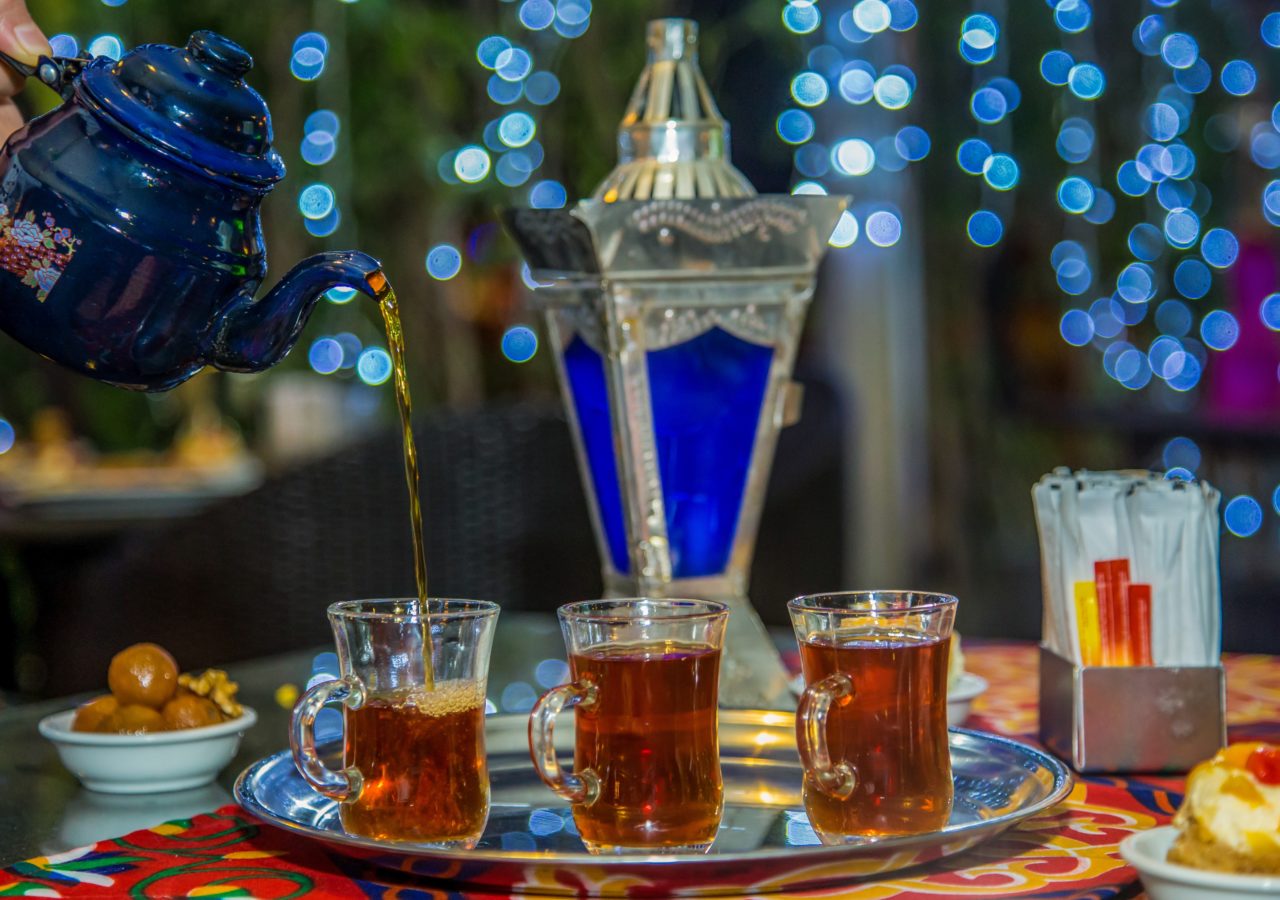In this article, Rajaa Alkawaf and Ghaidaa Aldahan share their expertise as medical herbalists in order to help us achieve better digestive health and combat some of the ailments that accompany the holy month and beyond.

Ramadan kareem! May the blessings of this month bring health & wellbeing to all.
Fasting is a time of repose from the everyday digestive functions of the body to allow for important detoxification and repair. Once the first few days of fasting pass and with it all the symptoms resulting from lack of caffeine, our brain becomes freed up for reflection and contemplation. May everyone reap all the benefits of this Godly gift to humans.
1. Rajaa, tell us a little bit about yourself and how you got into Herbal Health
I started my career working in clinical research in a Children’s hospital in Canada. Healthcare was my passion, and I was in the field that allowed me to be curious and to search for answers using the scientific method. Eventually, I got married and had my first child who was healthy until he started going to nursery/day care. Like all new parents I was constantly asked to give him antibiotics and fever reducing medicine, etc. However, my son was not getting healthier with these medications. In fact he was getting sick even more often. This started my research into alternative medicine to help build his immunity which eventually led me to join the Middlesex University Herbal medicine program and become a medical herbalist. I met my colleague Ghaidaa during the program and together we opened our clinic Herbal Health London. Our vision is to guide our communities to use herbs as prevention as well as cure to health problems through group teaching about plant medicine and one on one in depth consultations.
2. Can you give us an overview of the gut microbiome, its importance, what goes wrong and the possible ill health that results from this?
The gut microbiome refers to the vast community of microorganisms, including bacteria, viruses, fungi, and other microbes that reside in the gastrointestinal tract. It plays a crucial role in maintaining our overall health and well-being. The gut microbiome is involved in various functions, including digestion, absorption of nutrients, immune system regulation, and production of certain vitamins and hormones. It also helps prevent the growth of harmful bacteria and supports the function of the intestinal barrier, which helps prevent harmful substances from entering the bloodstream. When the gut microbiome is disrupted, it can lead to various health issues. Dysbiosis, which refers to an imbalance in the gut microbiome, has been linked to several conditions such as indigestion and bloating, irritable bowel syndrome (IBS), allergies, weight gain and obesity, autoimmune conditions and even mental health issues.
3. How can herbs (and fermented products) help protect the microbiome? What are some of the health benefits that you encounter with your clients?
Digestive herbs can greatly improve digestion which results in less heartburn, bloating and flatulence. Some antimicrobial herbs act as gentle antibiotics to kill unwanted microbes. Demulcent herbs heal damaged or ulcerated guts. Probiotic herbs and fermented food help grow a healthy microbiome. There are also herbs to support daily bowel movements and those that stop diarrhea.
Our favorite work at Herbal Health London is running the detox programs and more specifically the Gut Reset protocol. We have used it on hundreds of patients with great to incredible results. It is not a magic wand although it feels like one when you hear about it. It is rather a meticulous and rigorous program that requires discipline, but it changes our clients’ lives for good. Some of its benefits are clearer skin, daily healthy bowel movements, higher levels of energy, reduction of digestive issues, excess weight loss, improved joints (for those suffering from arthritic joints) and many other benefits.
4. What do people commonly suffer with during Ramadan with respect to digestion as a result of over eating, or change in routine or change in food composition for example?
If fasting in Ramadan is followed by unhealthy eating in the evening then it may lead to indigestion, obesity, sleeping issues and aggravation of current disease. Eating heavily in the evening goes against our natural circadian rhythm of digestion. The gut can only digest light food at night as our digestive muscles become partially dormant after 8pm.
5. What advice would you give to prevent this or restore optimal digestion?
To start with, we would advise to eating something bitter before your meal. Bitter foods help us make more digestive enzymes which in return make our digestion much easier.
Keep sweets to a minimum to avoid growing unhealthy gut flora. Have fruits or dates with nuts (both a great source of fiber) instead to satisfy your sweet cravings in a healthy way.
Hydrate with water or herbal tea and avoid drinking caffeinated drinks to support a good night of sleep.
Ideally take a 30 min brisk walk 1-2h after eating which will speed up the digestion and allow for restful sleep.
Suhour should also be light in case you plan to sleep after it. Bananas and oats could be a good option as they promote sleep.
6. Take us through a few herbs and superfoods and their properties and benefits for our health?
We mentioned earlier bitter herbs and the king of bitter herbs is Wormwood but there is also Dandelion root which is both a bitter and a bile release stimulant. Bile is a substance that the liver makes and stores in the gallbladder which in turn releases the bile when we eat to help digest fat. Dandelion root is also a great herb to use if you suffer from constipation or poor digestion. Finally, it is very helpful in growing healthy gut flora. This is why we use it extensively in our Gut Reset protocol.
On the nervous system side, we all heard about chamomile for calming the nerves, but less is known about Lemon balm. Lemon balm grows easily in the UK and is therefore very accessible. People probably have it in their garden as it can really grow extensively if not controlled. Lemon balm calms the nervous system so it helps with anxiety attacks as well as Irritable Bowel syndrome.
While we need herbs to calm us down, in other times we need herbs to make our brains sharp and alert. A nice decaf chai tea with its wholesome spices can be a lovely brain stimulant. Cardamom stimulates the brain and reliefs flatulence. Cinnamon is a blood sugar balancer among many other benefits. To complete the benefits of chai tea, I like to add Liquorice to it. This lovely woody herb adds sweetness to the tea while it supports the body stress management mechanism and makes feel energetic for longer. Just a watch out here for people who have high blood pressure (BP) as Liquorice can further increase their BP.
Now for the superfoods, beans are incredible source of nutrients as they are programmed to hold all the food supply to grow a new plant. The only drawback to eating beans is they need a good digestive system to break them into nutrients. Therefore bitter herbs become very useful to consume before eating beans which can be in the form of dandelion root tea.
Fermented food are superfoods as well because they hold a rich quantity of healthy bacteria. Examples of such foods are sauerkraut, kimchi, kefir yoghourt or kombucha drinks.
Finally foods that are rich in inulin like artichoke, asparagus, pumpkin and sweet potatoes help us grow healthy microflora which in turn keep our immunity strong to fight off viruses and other harmful microbes.
7. How can we incorporate these herbs and foods into our diet within and outside of Ramadan?
The best way to incorporate herbs in your everyday diet is to start drinking herbal tea throughout the day. For example, dandelion root boiled with cardamom pods is delicious and digestive. Fresh lemon balm tea smells amazing and will be a lovely addition in the evening when you want to wind down. There are many herbal teas that are delicious and useful which you can incorporate in your daily life. For more serious conditions, you can consult a herbalist who will teach you and give you access to other herbs to help you navigate your body back to health.
8. How can people find out more about your work?
At Herbal Health London, we are teaching about herbal medicine through group classes. Please contact us on info@herbalhealthlondon.com and we will be happy to share with you the program of our classes. We also offer one-on-one consultation online or in person to help you navigate complex or chronic health issues.


